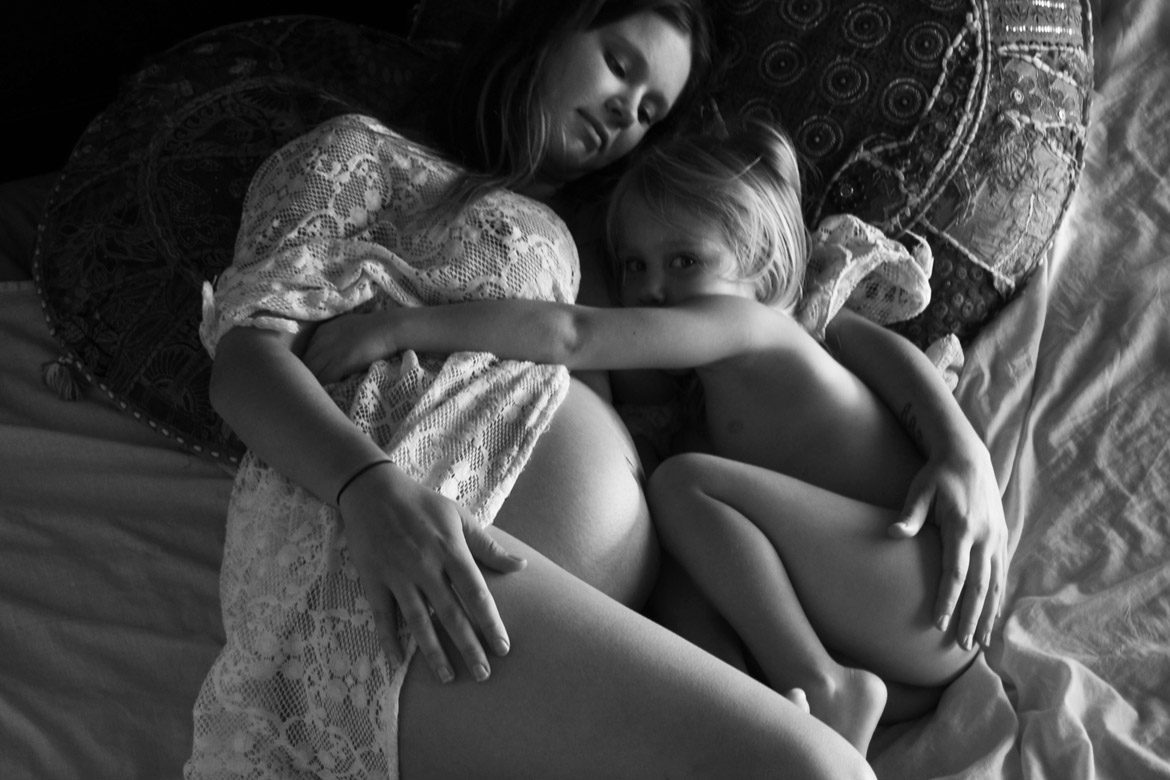By Emma Pickett IBCLC
Let’s imagine you are breastfeeding your toddler and you discover you’re pregnant. It’s a much wanted pregnancy but perhaps you weren’t expecting that positive test quite so quickly. And now here you are, pregnancy text still drying, teeny tiny new person inside you and less teeny person on the outside, very much still in love with breastfeeding.
By still feeding your toddler, you’ve already been up against it in terms of what most modern cultures find comfortable and acceptable. Now you’re ticking the box for another misunderstood area of breastfeeding: one full of myths and nonsense and one lots of uneducated people claim to be experts about.
Now you’re ticking the box for another misunderstood area of breastfeeding: one full of myths and nonsense and one lots of uneducated people claim to be experts about.
A useful starting point is finding a group online of mothers who have breastfed through pregnancy and beyond. That can be reassuring and immensely helpful but it’s worth remembering that every woman’s experience is different and it’s very hard to make predictions about how things will go for you.
I’m going to guess that when many people are looking at the drying pregnancy test, their thoughts shift to the consequences for their current nursling. Then soon, you wonder about the baby-to-be. Is breastfeeding during pregnancy ‘safe’?
What does the research say?
Let’s look at this study from 2012: A comparative study of breastfeeding during pregnancy: impact on maternal and newborn outcomes. Madarshahian F, Hassanabadi M. The study looked at 320 women in Iran, some breastfed during pregnancy and some did not. It showed that, “Results found no significant difference in full-term or non-full-term births rates and mean newborn birth weight between the two groups. We further found no significant difference between full-term or non-full-term births and mean newborn birth weight for those who continued and discontinued breastfeeding during pregnancy in the overlap group.”
So, breastfeeding during pregnancy didn’t ‘take nutrition away from the baby’ and it did not cause prematurity.
Another study of 57 Californian women from 1993: Breastfeeding during pregnancy. Moscone SR, Moore MJ. Just under half continued to breastfeed through pregnancy and after the new baby arrived. The new babies were healthy and appropriately sized.
However, it’s not all clearly positive. Another research study on 133 women in Peru found a link between breastfeeding through pregnancy and 125g on average less weight gain for the new baby in the first month. (Postpartum consequences of an overlap of breastfeeding and pregnancy: reduced breast milk intake and growth during early infancy. Marquis GS, Penny ME, Diaz JM, Marín RM. 2002)
Another study looked at 540 women in Egypt with sub-standard nutrition. Effect of pregnancy-lactation overlap on the current pregnancy outcome in women with substandard nutrition: a prospective cohort study. Shaaban OM, Abbas AM, Abdel Hafiz HA, Abdelrahman AS, Rashwan M, Othman ER (2015). This was not all positive news with increased risk of maternal anaemia and issues with infant growth. BUT there was NOT an increase in miscarriage risk when women breastfed through pregnancy.
How’s your nutrition and how are your iron levels? What’s the difference between women in Iran and California versus Peru and Egypt? If you are a mother with access to good nutrition, it appears you have less reason to be concerned.
Does breastfeeding trigger early labour? Even for those women who were struggling with other issues, it doesn’t appear so.
Hilary Flower is the go-to person on the subject of breastfeeding during pregnancy. Her book, “Adventures in Tandem Nursing” is considered the bible on this subject. It was first written in 2003 and is now out-of-print but a second edition is currently being worked on. Her focus was on bringing the facts to pregnant mothers and she looked at this idea of triggering contractions or early labour in detail. She reminds us that we need oxytocin to trigger a milk ejection reflex (the letdown reflex) and this is also the hormone that can trigger uterine contractions. However, this doesn’t mean that breastfeeding in pregnancy triggers risky contractions and there are several safeguards in place. We need hormone receptor sites to exist before hormones get acted on by the uterus and they remain small in number until around 38 weeks of pregnancy. And even the hormone receptors that are in place can’t really do their job of causing contractions as there are oxytocin blockers in place like progesterone (made by the placenta) and proteins missing which would act as special agents to help the oxytocin do their job. Triple protection! So, oxytocin can carry on doing its breastfeeding jobs while baby remains protected in the uterus.
I think we can say science is on our side. Which makes sense when you think that throughout history women have been breastfeeding older babies and having sex and getting pregnant.
Do you know anything about the history of pregnancy testing? Today, we might know we are pregnant days after conception. For generations, it was based on guess work, someone examining your urine’s appearance and something about rabbits (early 20th century pregnancy tests involved injecting urine into a rabbit and observing a change in their ovaries). A lot of breastfeeding women couldn’t rely on whether they had missed a period as periods may only just be settling in or may not have even appeared yet. Some breastfeeding mums get pregnant without yet having a period. They ‘catch the first egg’. Then they go and see their doctor and the doctor brings out the chart that predicts due date based on last menstrual period, “errr…2015?”
Nature isn’t daft. If breastfeeding during pregnancy was hazardous, I doubt you nor I would be here. Hilary Flower mentions that if you have a high-risk pregnancy, you should talk to your health care providers about your specific situation but if you are safe to continue sexual intercourse, breastfeeding is very very likely to be fine too.
Continue reading on Page 2…











